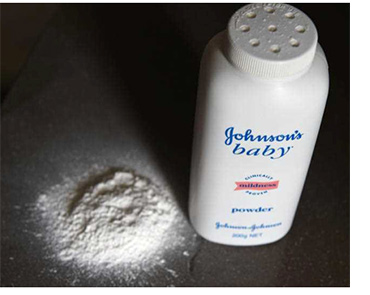


*** UPDATE ***
If you or a loved one have developed ovarian cancer following talcum powder use, contact us today for a free case evaluation at 1-800-CALL-KEN. Read More: https://mobile.reuters.com/article/idUSKCN0XT20L

Despite now mounting evidence of serious health affects with genital use of talcum powder, major manufacturers of talcum powder products do not warn consumers of the potential dangers. Talc products used regularly in the genital area can increase the risk of ovarian cancer if talc particles travel through the vagina and uterus, into the fallopian tubes and ovaries. A December 2015 study, written by Dr. Daniel Cramer of Harvard University, found a direct link between inflammation from talc particles in the reproductive system and the development of ovarian cancer. See Cramer, DW, et al., Association Between Talc Use and Ovarian Cancer: A Retrospective Case Control Study In Two U.S. States, Epidemiology (Dec. 17, 2015). The report found that those who regularly applied talcum powder products to their genitals, tampons, sanitary napkins and/or undergarments were at 33% greater risk of developing ovarian cancer than those who did not use talcum powder products.
The International Agency for Research on Cancer (IARC), part of the World Health Organization (WHO), has concluded that, based on limited evidence from human studies of a link to ovarian cancer, IARC classifies the perineal (genital) use of talc-based body powder as “possibly carcinogenic to humans.”
An estimated 20,000 women are diagnosed each year with ovarian cancer, and according to Dr. Cramer, as many as 10,000 of those women develop ovarian cancer as a result of baby powder use. Ovarian cancer symptoms may include bloating, abdominal pain, changes in bladder and bowel movements and overall fatigue. Ovarian cancer is a serious disease and is expected to result in more than 14,000 deaths this year in the United States.
Recently, a Missouri jury awarded $72,000,000 to the family of a Birmingham, Alabama woman who died of ovarian cancer following daily use of Johnson & Johnson’s baby powder and other products containing talcum powder. At trial, attorneys introduced into evidence a September 1997 internal memo from a Johnson & Johnson medical consultant suggesting that “anybody who denies [the] risks” between “hygenic” talc use and ovarian cancer would be publicly perceived in the same light as those who denied a link between smoking cigarettes and cancer: “Denying the obvious in the face of all evidence to the contrary.” Yet, incredibly, Johnson & Johnson has to date continued to fail to warn users of their talcum powder products of this risk.
An expert at trial testified at least 45,000 women have died as a result of ovarian cancer that could be attributed to talcum powder use on the genitals, and estimated 1,500 women will die within the next year as a result of talc use.
If you or a loved one have suffered from ovarian cancer following regular use of Johnson & Johnson or Shower to Shower talcum powder products, contact us today for a free legal consultation.
Let an Atlanta negligence lawyer help you with a free case review to determine the extent of your injuries and your product liability claim. For all injuries caused by negligence, including Atlanta product liability, click the chat bubble to send us a message or call us toll free at 1-888-579-1790.


